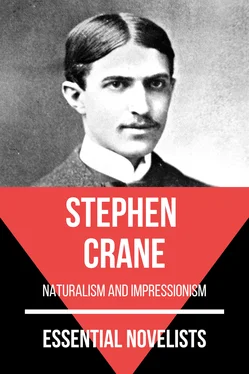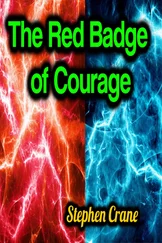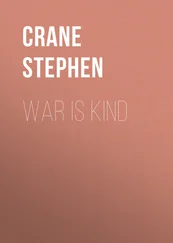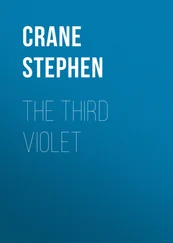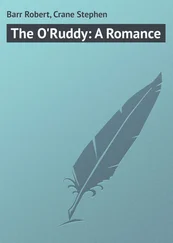He went slowly to his tent and stretched himself on a blanket by the side of the snoring tall soldier. In the darkness he saw visions of a thousand-tongued fear that would babble at his back and cause him to flee, while others were going coolly about their country's business. He admitted that he would not be able to cope with this monster. He felt that every nerve in his body would be an ear to hear the voices, while other men would remain stolid and deaf.
And as he sweated with the pain of these thoughts, he could hear low, serene sentences. "I'll bid five." "Make it six." "Seven." "Seven goes."
He stared at the red, shivering reflection of a fire on the white wall of his tent until, exhausted and ill from the monotony of his suffering, he fell asleep.
––––––––

WHEN ANOTHER NIGHT came, the columns, changed to purple streaks, filed across two pontoon bridges. A glaring fire wine-tinted the waters of the river. Its rays, shining upon the moving masses of troops, brought forth here and there sudden gleams of silver or gold. Upon the other shore a dark and mysterious range of hills was curved against the sky. The insect voices of the night sang solemnly.
After this crossing the youth assured himself that at any moment they might be suddenly and fearfully assaulted from the caves of the lowering woods. He kept his eyes watchfully upon the darkness.
But his regiment went unmolested to a camping place, and its soldiers slept the brave sleep of wearied men. In the morning they were routed out with early energy, and hustled along a narrow road that led deep into the forest.
It was during this rapid march that the regiment lost many of the marks of a new command.
The men had begun to count the miles upon their fingers, and they grew tired. "Sore feet an' damned short rations, that's all," said the loud soldier. There was perspiration and grumblings. After a time they began to shed their knapsacks. Some tossed them unconcernedly down; others hid them carefully, asserting their plans to return for them at some convenient time. Men extricated themselves from thick shirts. Presently few carried anything but their necessary clothing, blankets, haversacks, canteens, and arms and ammunition. "You can now eat and shoot," said the tall soldier to the youth. "That's all you want to do."
There was sudden change from the ponderous infantry of theory to the light and speedy infantry of practice. The regiment, relieved of a burden, received a new impetus. But there was much loss of valuable knapsacks, and, on the whole, very good shirts.
But the regiment was not yet veteranlike in appearance. Veteran regiments in the army were likely to be very small aggregations of men. Once, when the command had first come to the field, some perambulating veterans, noting the length of their column, had accosted them thus: "Hey, fellers, what brigade is that?" And when the men had replied that they formed a regiment and not a brigade, the older soldiers had laughed, and said, "O Gawd!"
Also, there was too great a similarity in the hats. The hats of a regiment should properly represent the history of headgear for a period of years. And, moreover, there were no letters of faded gold speaking from the colors. They were new and beautiful, and the color bearer habitually oiled the pole.
Presently the army again sat down to think. The odor of the peaceful pines was in the men's nostrils. The sound of monotonous axe blows rang through the forest, and the insects, nodding upon their perches, crooned like old women. The youth returned to his theory of a blue demonstration.
One gray dawn, however, he was kicked in the leg by the tall soldier, and then, before he was entirely awake, he found himself running down a wood road in the midst of men who were panting from the first effects of speed. His canteen banged rythmically upon his thigh, and his haversack bobbed softly. His musket bounced a trifle from his shoulder at each stride and made his cap feel uncertain upon his head.
He could hear the men whisper jerky sentences: "Say—what's all this—about?" "What th' thunder—we—skedaddlin' this way fer?" "Billie—keep off m' feet. Yeh run—like a cow." And the loud soldier's shrill voice could be heard: "What th'devil they in sich a hurry for?"
The youth thought the damp fog of early morning moved from the rush of a great body of troops. From the distance came a sudden spatter of firing.
He was bewildered. As he ran with his comrades he strenuously tried to think, but all he knew was that if he fell down those coming behind would tread upon him. All his faculties seemed to be needed to guide him over and past obstructions. He felt carried along by a mob.
The sun spread disclosing rays, and, one by one, regiments burst into view like armed men just born of the earth. The youth perceived that the time had come. He was about to be measured. For a moment he felt in the face of his great trial like a babe, and the flesh over his heart seemed very thin. He seized time to look about him calculatingly.
But he instantly saw that it would be impossible for him to escape from the regiment. It inclosed him. And there were iron laws of tradition and law on four sides. He was in a moving box.
As he perceived this fact it occurred to him that he had never wished to come to the war. He had not enlisted of his free will. He had been dragged by the merciless government. And now they were taking him out to be slaughtered.
The regiment slid down a bank and wallowed across a little stream. The mournful current moved slowly on, and from the water, shaded black, some white bubble eyes looked at the men.
As they climbed the hill on the farther side artillery began to boom. Here the youth forgot many things as he felt a sudden impulse of curiosity. He scrambled up the bank with a speed that could not be exceeded by a bloodthirsty man.
He expected a battle scene.
There were some little fields girted and squeezed by a forest. Spread over the grass and in among the tree trunks, he could see knots and waving lines of skirmishers who were running hither and thither and firing at the landscape. A dark battle line lay upon a sunstruck clearing that gleamed orange color. A flag fluttered.
Other regiments floundered up the bank. The brigade was formed in line of battle, and after a pause started slowly through the woods in the rear of the receding skirmishers, who were continually melting into the scene to appear again farther on. They were always busy as bees, deeply absorbed in their little combats.
The youth tried to observe everything. He did not use care to avoid trees and branches, and his forgotten feet were constantly knocking against stones or getting entangled in briers. He was aware that these battalions with their commotions were woven red and startling into the gentle fabric of softened greens and browns. It looked to be a wrong place for a battle field.
The skirmishers in advance fascinated him. Their shots into thickets and at distant and prominent trees spoke to him of tragedies—hidden, mysterious, solemn.
Once the line encountered the body of a dead soldier. He lay upon his back staring at the sky. He was dressed in an awkward suit of yellowish brown. The youth could see that the soles of his shoes had been worn to the thinness of writing paper, and from a great rent in one the dead foot projected piteously. And it was as if fate had betrayed the soldier. In death it exposed to his enemies that poverty which in life he had perhaps concealed from his friends.
The ranks opened covertly to avoid the corpse. The invulnerable dead man forced a way for himself. The youth looked keenly at the ashen face. The wind raised the tawny beard. It moved as if a hand were stroking it. He vaguely desired to walk around and around the body and stare; the impulse of the living to try to read in dead eyes the answer to the Question.
Читать дальше
